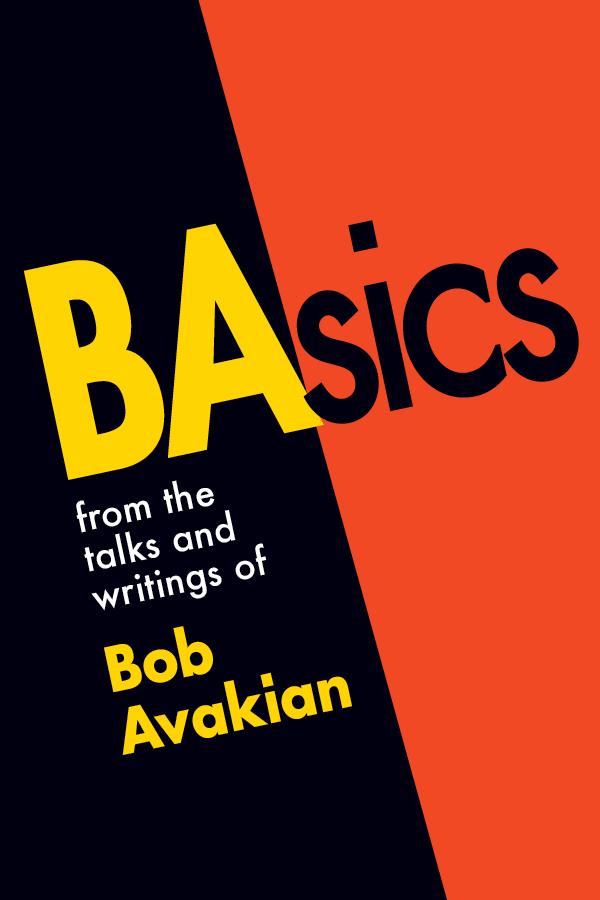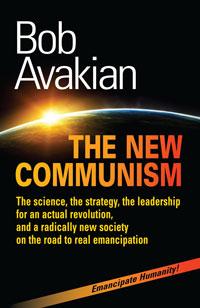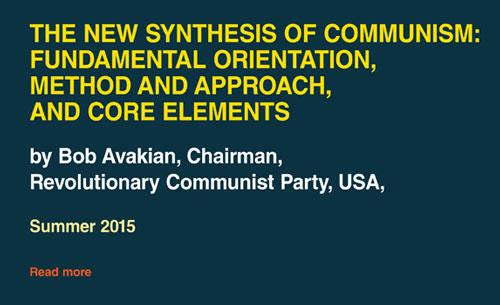BAsics from the Talks and Writings of Bob Avakian
Internationalism—The Whole World Comes First.
—BAsics 5:8
~~~
Imperialism means huge monopolies and financial institutions controlling the economies and the political systems—and the lives of people—not just in one country but all over the world. Imperialism means parasitic exploiters who oppress hundreds of millions of people and condemn them to untold misery; parasitic financiers who can cause millions to starve just by pressing a computer key and thereby shifting vast amounts of wealth from one place to another. Imperialism means war—war to put down the resistance and rebellion of the oppressed, and war between rival imperialist states—it means the leaders of these states can condemn humanity to unbelievable devastation, perhaps even total annihilation, with the push of a button.
Imperialism is capitalism at the stage where its basic contradictions have been raised to tremendously explosive levels. But imperialism also means that there will be revolution—the oppressed rising up to overthrow their exploiters and tormentors—and that this revolution will be a worldwide struggle to sweep away the global monster, imperialism.
—BAsics 1:6
~~~
If you can conceive of a world without America—without everything America stands for and everything it does in the world—then you’ve already taken great strides and begun to get at least a glimpse of a whole new world. If you can envision a world without any imperialism, exploitation, oppression—and the whole philosophy that rationalizes it—a world without division into classes or even different nations, and all the narrow-minded, selfish, outmoded ideas that uphold this; if you can envision all this, then you have the basis for proletarian internationalism. And once you have raised your sights to all this, how could you not feel compelled to take an active part in the world historic struggle to realize it; why would you want to lower your sights to anything less?
—BAsics 1:31
~~~
The interests, objectives, and grand designs of the imperialists are not our interests—they are not the interests of the great majority of people in the U.S. nor of the overwhelming majority of people in the world as a whole. And the difficulties the imperialists have gotten themselves into in pursuit of these interests must be seen, and responded to, not from the point of view of the imperialists and their interests, but from the point of view of the great majority of humanity and the basic and urgent need of humanity for a different and better world, for another way.
—BAsics 3:8
~~~
The achievement of [the necessary conditions for communism] must take place on a world scale, through a long and tortuous process of revolutionary transformation in which there will be uneven development, the seizure of power in different countries at different times, and a complex dialectical interplay between the revolutionary struggles and the revolutionization of society in these different countries...[a dialectical relation] in which the world arena is fundamentally and ultimately decisive while the mutually interacting and mutually supporting struggles of the proletarians in different countries constitute the key link in fundamentally changing the world as a whole.
—BAsics 2:12
From the Constitution for the New Socialist Republic in North America, authored by Bob Avakian
Article IV. The Economy and Economic Development in the New Socialist Republic in North America. Section 1.
The economy of the New Socialist Republic in North America is a planned socialist economy, under the direction of the state and led by the Revolutionary Communist Party, in accordance with the principles and provisions set forth in Article I, Section 2 and elsewhere in this Constitution. Social production and economic development are guided and evaluated according to three overarching criteria:
1. Advancing the world revolution to uproot all exploitation and oppression and to emancipate all of humanity;
2. Meeting social need, creating a common material wealth that contributes to the all-around development of society and the individuals who make it up, and overcoming oppressive divisions between mental and manual labor, town and country, different regions and nationalities, and men and women;
3. Protecting, preserving, and enhancing the ecosystems and biodiversity of the planet for current and future generations.
In this polemic by the OCR of Mexico, which is in Demarcations #4, they discuss both the material basis and the ideological basis for internationalism. The material basis being the fact that there’s a whole world system and not just a bunch of different systems within different particular countries, all self-contained, that somehow then interact with each other on the foundation of their essential self-containment. So that’s the material basis of internationalism. There’s the operation of the system of imperialism on a world scale. It operates economically, and that has real effects on people, sometimes even driving people in the millions from one country all the way to other parts of the world (coming from Nepal, or someplace else, they end up working in Bahrain, in 120 degree weather, dying in the heat). And this world system operates not only economically but also politically and diplomatically. It operates militarily. All that, on a world scale, in an overall and fundamental sense, is setting the stage for what we have to do—setting the stage, as the principal aspect, in dialectical relation with the struggles of various kinds that this gives rise to—and, above all, the revolutionary struggles of the masses of people, especially as they are led by conscious and organized communist forces.
But then the OCR polemic also speaks about the ideological basis for internationalism (the ideological basis meaning the way, or method, of thinking). Mao made the point in one of his important philosophical works, “On Contradiction,”40 that it is the internal contradictions within a thing that provide the basis for it to change. He gave the example of an egg and a stone: an egg, at the right temperature, can produce a living being, but a stone cannot. Why? Because of the internal contradictions and dynamics within the one and the other. Because of its internal nature, a stone does not have the basis to produce a living being, and no matter how much you heat it up, it’s not going to produce one. Mao used this as an example to illustrate that internal contradictions are the basis for change within a thing. And he made the point, using this same example, that the temperature that might be applied to an egg can be the immediate cause of change, it is an external condition which can be a cause of the change, but it’s not the fundamental basis for the change. It’s like heating up water. The reason water can turn into steam is because of the internal nature of, and the internal contradiction within, water. The heating is the immediate cause of the change, while the internal nature of water is the basis for the change. So this was an important point made by Mao. But, unfortunately, at times he applied this in a kind of one-sided way, beyond the point where it was correct. Let me put it this way: Even while Mao was fundamentally internationalist, there was a tendency in Mao to say that each country has its own internal contradictions and that’s the fundamental basis for revolution within that country. He was applying the principle that the internal contradictions are the basis for change—which is a correct and very important principle, and something that was not clearly grasped and acted upon in the communist movement up to that point (it’s not that there was no understanding of that, but there was still a lot of unclarity about that). But the problem is that, in the era of capitalist imperialism, internal contradiction applies differently.
This is another one of those complexities—there are different levels of the organization of matter. A country, to put it simply, is one level of the organization of matter—countries and the people in them (and everything else in them) are made up of matter in motion, in many different forms. The world arena, the world as a whole, is another level of the organization of matter. So, in one sense, or on one level, the internal contradictions within a country are the basis for it to change, but in turn that country is part of a larger whole, the larger world, and it’s the internal contradictions of that larger world as a whole which are, in the final analysis, more determining, even of what happens within a particular country.
To illustrate this, an example that’s used in this polemic by the OCR of Mexico is the human body, and the different levels of the organization of matter in the human body (this example was used in an article of mine, “‘Crises in Physics,’ Crises in Philosophy and Politics,”41 which is found in Demarcations #1, and it was also used in this OCR polemic). The human body is made up of a lot of different cells, and it’s made up of different organs—the liver, the kidney, the heart, and so on and so forth. Each of those particular levels of the organization of matter have their own internal contradictions—kidneys have their own internal contradictions, livers have their own internal contradictions, the same with the heart, and so on. But, in turn, they’re part of a larger body, and what is happening to that larger body (or the person as a whole) is, in an overall sense, more determining of what happens even to those internal organs than just the internal contradictions of those internal organs themselves. Now, here’s the complexity of it, once again: it’s not like the internal organs don’t affect the body as a whole. If you have contradictions that cause your heart to fail, it’s obviously going to affect your whole body. And the same with other organs, like your liver or your kidney. So there is, once again, a contradictory, a dialectical, relation. But overall, the body—the person as a whole—interacting with the larger environment, is the entity that is most determining; the contradictions within that body are mainly what determines what happens to the body as a whole, even though, at a particular time, what’s happening to a particular organ of the body—based on its internal contradictions, in interaction with the rest of the body and with the larger environment—can become the concentration point of what’s happening to your body as a whole, just like a particular country in the world can become the concentration point of the contradictions in the world.
40. Mao Tsetung, “On Contradiction,” 1937. [back]
41. Bob Avakian, “‘Crises in Physics,’ Crises in Philosophy and Politics,” in Demarcations: A Journal of Communist Theory and Polemic, Issue Number 1, Summer-Fall 2009. Originally appeared in Revolution #161, April 12, 2009. Available at demarcations-journal.org and revcom.us. [back]
From THE NEW SYNTHESIS OF COMMUNISM:
FUNDAMENTAL ORIENTATION, METHOD AND APPROACH, AND CORE ELEMENTS—AN OUTLINE
by Bob Avakian, Summer 2015
Internationalism
- The material basis and philosophical basis, and the overall approach, of communist internationalism.
(BAsics 2:12; “Advancing the World Revolutionary Movement: Questions of Strategic Orientation”; “Communism or Nationalism?,” a polemic by the OCR, Mexico, in Demarcations #4)
- Summing up the first wave of the communist movement/socialist states.
(Conquer the World? The International Proletariat Must and Will; Unresolved Contradictions, Driving Forces for Revolution, Part 2 and Part 3; Communism: The Beginning of a New Stage, A Manifesto from the Revolutionary Communist Party, USA; “You Don’t Know What You Think You ‘Know’ About... The Communist Revolution and the REAL Path to Emancipation: Its History and Our Future,” An Interview with Raymond Lotta, Revolution #323, November 24, 2013)



